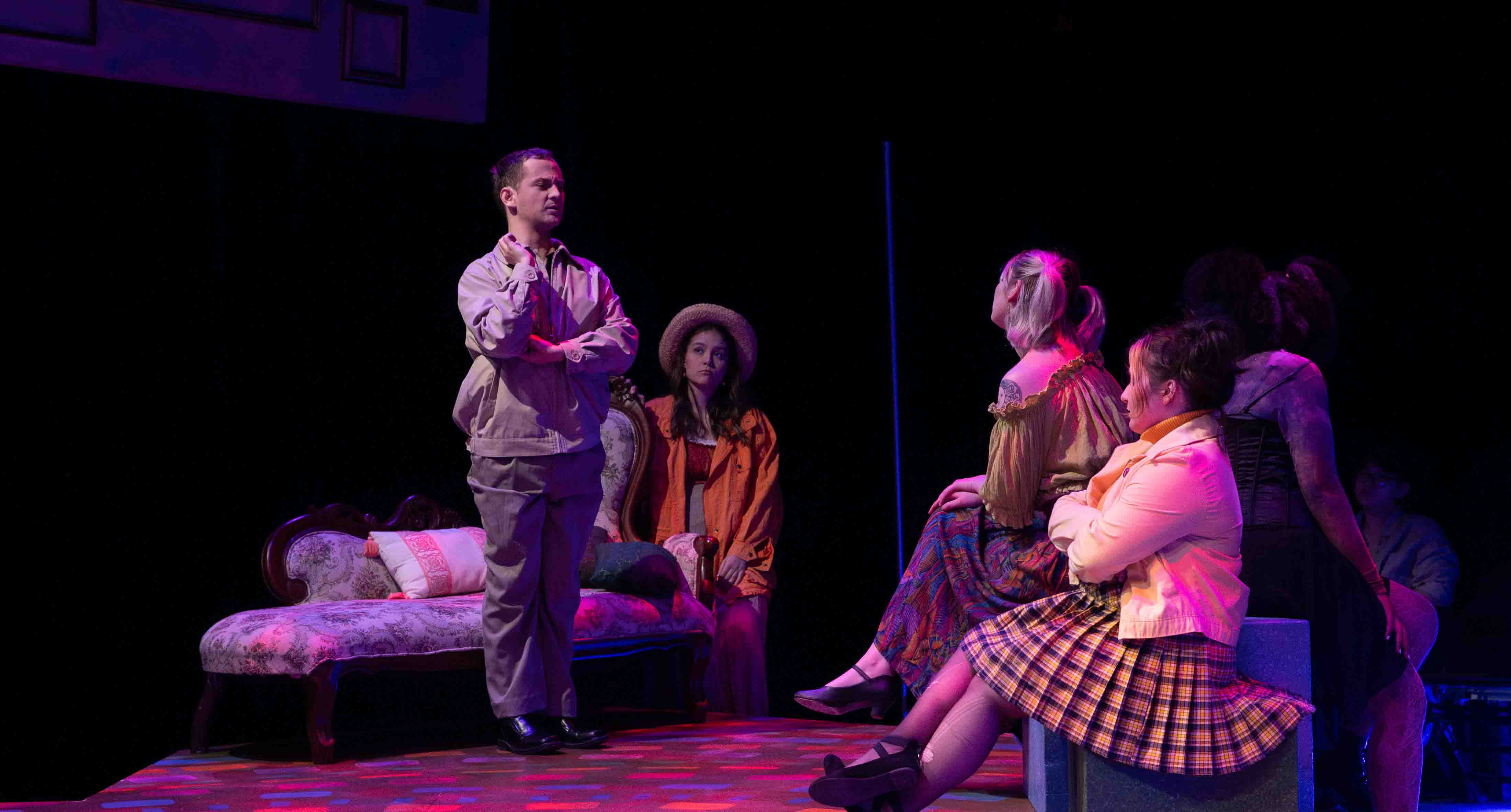B.F.A. Theatre Program Map

Acting Concentration
The purpose of the Bachelor of Fine Arts in Theatre (Acting) is to prepare the student for the professional life as an actor. Through rigorous training, the BFA in Theatre (Acting) will develop students to be confident, proficient, and knowledgeable professionals who will be able to work in the stage and film industries.
stats
60
Core Credit Hours
51
Major Credit Hours
9
Elective Credit Hours
- Plan Your Degree
- Crush Your Course
- Find Your Place
- Broaden Your Perspectives
- Connect Off-Campus
- Take Care of Yourself
- Pave Your Path
Plan Your Degree
Disclaimer: This program map is intended ONLY as a guide for students to plan their course of study. It does NOT replace any information in the Undergraduate Catalog, which is the official guide for completing degree requirements.
| Course Name | Credit Hours |
|---|---|
|
C1: ENGL 1101
English Composition I |
3 |
|
I1: Institutional Option |
3 |
|
F: THEA 2290
Stage & Film Craft I |
3 |
|
F: THEA 1100
Theatre Appreciation |
3 |
|
F: THEA 1111
Performance & Production |
1 |
|
I2: Institutional Option |
2 |
Milestone:
- Complete ENGL 1101 with a C or better.
| Course Name | Credit Hours |
|---|---|
|
C2: ENGL 1102
English Composition II |
3 |
|
M: MATH 1001
Quantitative Skills & Reasoning |
3 |
|
A2: Humanities |
3 |
|
F: THEA 2100
Play Analysis |
3 |
|
THEA 1291
Voice & Movement I |
3 |
|
F: THEA 1112
Performance & Production |
1 |
|
THEA 1000
Theatre Laboratory |
0 |
Milestones:
- Complete ENGL 1102 with a C or better.
- FL complete.
15 Fall Credit Hours + 16 Spring Credit Hours = 31 Credit Hours
| Course Name | Credit Hours |
|---|---|
|
P1: HIST 2111 OR 2112
US History |
3 |
|
THEA 1292
Voice & Movement 2 |
3 |
|
F: THEA 2291
Developing a Character |
3 |
|
F: THEA 2111
Performance and Production |
1 |
|
I2: Institutional Options
(If not already taken) |
2 |
|
T1: Science + Lab
|
4 |
Milestone:
- First semester of THEA 2900; must pass to continue in BFA.
| Course Name | Credit Hours |
|---|---|
|
P2: POLS 1101
American Government |
3 |
|
S1: HIST 1111 OR 1112
World History |
3 |
|
THEA 2292
Contemporary Scene Study |
3 |
|
F: THEA 2112
Performance and Production |
1 |
|
THEA 2900
Sophomore Assessment |
0 |
|
S2: Social Science
|
3 |
|
T2: Non-lab Science
|
3 |
Milestone:
- Must pass THEA 2900 to continue in BFA.
14 Fall Credit Hours + 16 Spring Credit Hours = 30 Credit Hours
| Course Name | Credit Hours |
|---|---|
|
THEA 3391
Acting Shakespeare |
3 |
|
F: THEA 2310
Stage Makeup |
3 |
|
THEA 3357
Theatre History I |
3 |
| T3: Non-lab Science | |
| Free Elective | 3 |
| Course Name | Credit Hours |
|---|---|
|
THEA 2491
Acting for the Camera |
3 |
|
THEA 3415
Playwriting I: Devised Theatre |
3 |
|
THEA 3394
Directing |
3 |
|
THEA 4457
Theatre History II |
3 |
|
THEA 2380, 2391, 2393, OR 2395 |
2 |
|
THEA 3900
Junior Assessment |
0 |
15 Fall Credit Hours + 14 Spring Credit Hours = 29 Credit Hours
| Course Name | Credit Hours |
|---|---|
|
THEA 3392
Period Scene Study |
3 |
|
THEA 4291
Advanced Voice |
3 |
|
THEA 4415
Playwriting 2 |
3 |
|
THEA 3491
Advanced Acting for the Camera |
3 |
| Free Elective | 3 |
| Course Name | Credit Hours |
|---|---|
|
THEA 4485 OR 4486
Special Topics in Theatre or Internship |
3 |
|
THEA 4412
The Business of Acting |
3 |
|
THEA 4111
Production and Performance Capstone |
3 |
|
A1: XIDS 2100
Arts and Ideas: Special Topics |
3 |
| Free Elective | 3 |
15 Fall Credit Hours + 15 Spring Credit Hours = 30 Credit Hours
Additional Information:
- Students come into the Theatre Major in the BA program. To become a BFA candidate, students must have a 2.5 GPA in their first 30 credit hours of courses and a 3.0 GPA in their Theatre courses. They must take THEA 2900 twice and pass portfolio review in front of a faculty committee to be admitted into the BFA in Theatre (Acting) program. They must then take on a major design once per year until they graduate.
Crush Your Course
First Year:
- Sign up for the Theatre Learning Community for your first fall and spring semesters.
- Take the XIDS 2002: Theatre and Collaboration Cornerstone Course in your first fall semester.
- Get to know the Theatre Company! Take THEA 1000 Theatre Laboratory in your first spring semester.
Middle Years:
- If you choose and qualify to be a BFA candidate, take THEA 2900 sophomore assessment (Actors take THEA 2291 and/or take THEA 2292 in your second year. Designers take THEA 2214 and 2215 in your second year.)
Last Year:
- Audition for or present a design portfolio at a theatre conference or festival.
- Crush your Capstone by enrolling in THEA 4111 and working with a faculty mentor on your project.
- Prepare your professional resume and website for your senior showcase.
Find Your Place
First Year:
- Over the summer, contact your Theatre Buddy.
- Actors Audition for the Fall and Spring Productions.
- Designers sign up for tech positions!
- Take the Front of House Workshop in the fall semester.
Middle Years:
- Join APO, the Theatre Fraternity and help promote the theatre productions!
- Research theatres in Atlanta where you would like to work when you graduate!
Last Year:
- With a faculty mentor, create a five-year plan for after graduation.
- Consider an internship with a Georgia Industry Partner (Professional Theatre, Talent Agency, Film Studio).
Broaden Your Perspectives
First Year:
- Check out the education abroad office.
Middle Years:
- Consider a study abroad program. Check out students’ stories of their experiences.
Last Year:
- Assess your cultural competency.
- Consider working abroad and research visa regulations.
- Explore practices of creating more inclusive careers.
Connect Off-Campus
First Year:
- Visit Wolves Vote to learn about the voting process and registration.
- Consider volunteering for a campaign or organization in your community.
Middle Years:
- Complete an internship in your field.
- Consider a summer or part-time job.
- Ask your department about networking opportunities with alumni.
Last Year:
- Ask for advice from professionals in your field of interest.
- Explore career shadowing opportunities.
Take Care of Yourself
First Year:
- Visit Health Services.
- Get fit! Visit URec to see all your options.
- Visit the Center for Economic Education and Financial Literacy.
Middle Years:
- Take a fitness class, climb the rock wall, or join an intramural team.
- Consider whether counseling is right for you: take a mental health screening.
Last Year:
- Explore a farmer’s market for fresh produce.
- Develop a post-graduation exercise plan.
- Explore your loan repayment options and complete your exit counseling.
Pave Your Path
First Year:
- Complete a self-assessment to see what careers and majors are right for you.
- Visit Career Services.
- Create your profile on Handshake.
- Consider applying for an on-campus job.
Middle Year:
- Draft your resume and attend a resume blitz.
- Learn about how to network on social media and update your Handshake profile.
- Draft your personal statement.
- Visit the graduate school to find out about graduate programs and admission requirements.
Last Year:
- Request references from professors and supervisors.
- Draft your resume cover letter and personal statement and revise it with career services.
- Attend business fairs and career fairs at UWG and across the state.
- Attend an interview workshop.
- Apply for graduate programs.
Careers

Career Opportunities
This degree may help you get work as the following:
- Actor
- Designer
- Educator
- Event Coordinator
- Instructor
- Performer
- Producer
- Production Assistant
- Stagehand
- Writer
HeadingSub-Heading
Have any questions about your major?
Don't forget to check out Wolf Watch to explore degree requirements!
